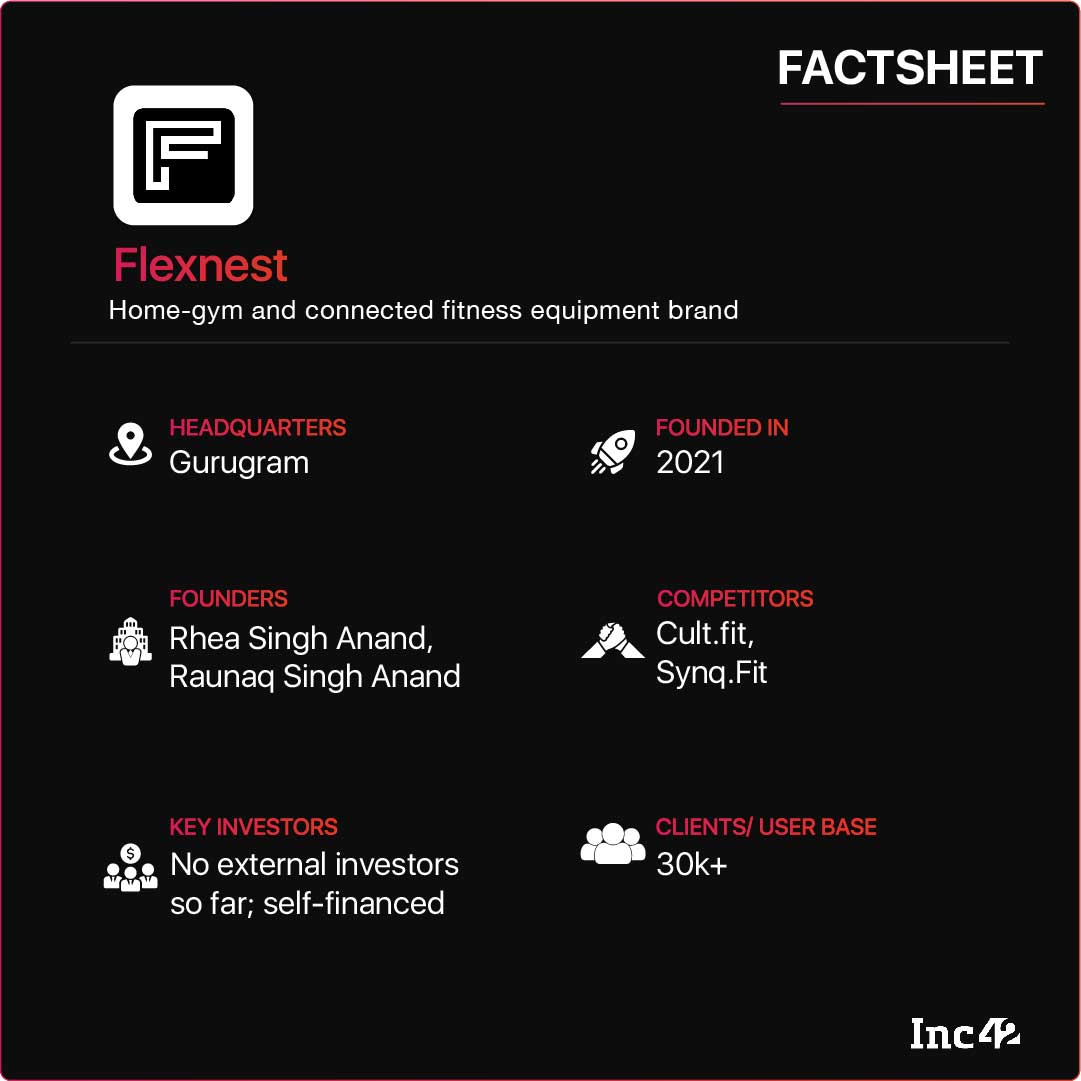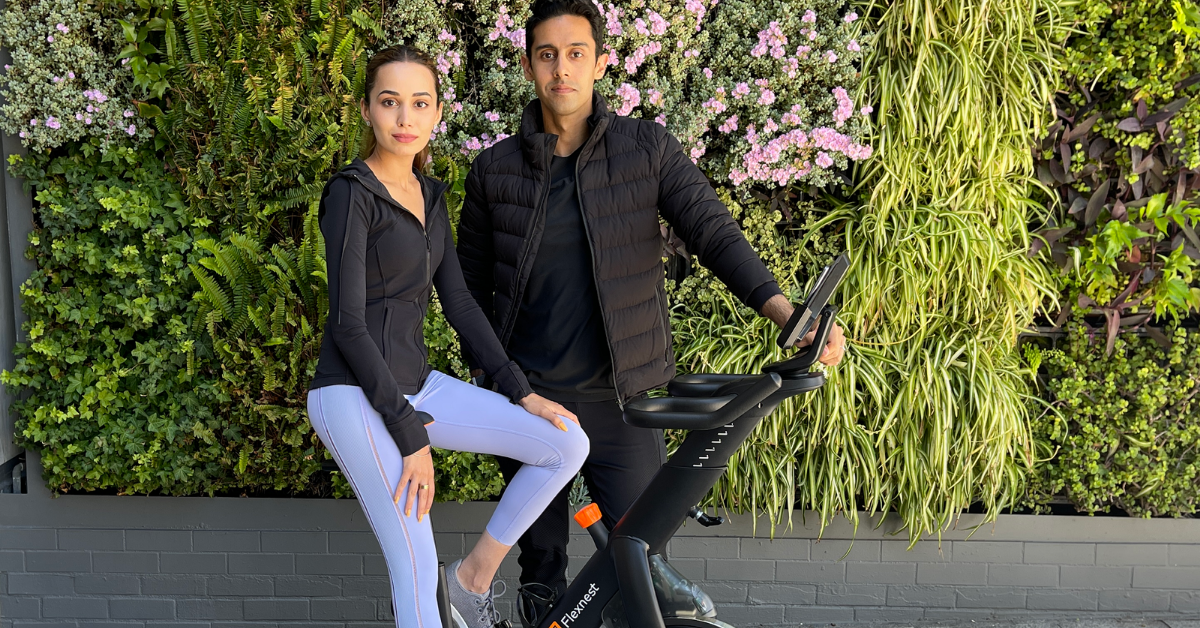The Covid-19 pandemic has changed the world in different aspects and also shifted the course of how businesses function across the globe. One of the few industries where the pandemic has come both as a curse and a boon is the fitness industry. While gym owners, yoga centres and fitness trainers had to witness a lull period, the home equipment market for fitness started booming during the pandemic resulting in more players also trying to make such equipment smarter.
Startups like Gurugram-based D2C fitness brand Flexnest come into the picture here. It is a newbie in this space that is currently trying to tap into the home gym equipment and connected fitness space opportunity.
According to a 2020 research by fitness discovery platform Gympik that surveyed over 50,000 fitness enthusiasts in India, only 20% of respondents were eager to go back to gyms. Around 93% of those surveyed had expressed doubts about sanitisation measures and hygiene aspects in the shared public gym setup.
After two years since the pandemic started, today, people have started reimagining workplaces and prioritising family time, which makes hybrid or home gyms one of the most obvious sought-after fitness choices. The emergence of new Covid-19 variants has also kept the fear of visiting public gyms alive.
As per a 2022 fitness survey by ACSM’s Health & Fitness Journal, the increase in adoption of wearables technology is the top trend, followed by home gyms ranking 2nd. People are setting up home gyms with minimal equipment or expensive treadmills and bikes. The perks of home gyms are the flexibility it provides – it can be solo or a family event. In fact, the survey report says it’s the first year that home exercise gyms have appeared as a fitness trend.
Hence, more businesses are kicking off with the primary objective of capturing the increasing number of users in the connected fitness space, where home fitness products can enable users to get a virtual gym-like experience at home.
The Inception Of Flexnest
Founded in January last year by a husband-wife duo, Rhea Singh Anand and Raunaq Singh Anand, Flexnest is focussing on building a full portfolio of connected equipment to enable a well-equipped home workout regime.
Within a year of its operation, the startup claims to have a customer base of more than 30,000, out of which 20,000 are on its connected platform. In the connected fitness segment, the startup currently has smart cycles and rowers. The fitness startup is also planning to launch cross trainers and treadmills to capture the booming demand for these cardio training equipment.
The hardware part of Flexnest’s fitness products is contract manufactured and imported from Taiwan and China. Flexnest app and all its trainer-guided classes are developed and shot in-house in Gurugram. Besides, the product design and quality control are also done in India.
Flexnest’s mobile app, in sync with the connected equipment, provides pre-recorded videos of training sessions for users to workout under the supervision of fitness trainers. Singh said that the users are also provided with report cards on the amount of calories they have burnt, their performance level compared to other users and more such metrics.
The startup also offers a range of non-connected products such as dumbbells, yoga mats, resistance bands and more.
Even in the non-connected part of it, Flexnest’s app provides users with training videos in various workout categories and types, including strength training, endurance, free exercise, and weight training.
In January 2022 alone, the startup recorded a revenue of INR 3.83 Cr. Currently, it estimates to have generated an annualised revenue of over $5 Mn (over INR 37.88 Cr) in the last 12 months since its launch.

Going forward, the startup plans to introduce a subscription model for its virtual connected fitness platform and video training sessions for the connected equipment.
Flexnest is currently projecting an annualised revenue of INR 100 Cr between April 2022 and March 2023.
“In connected fitness space in India, no one offers a full portfolio of equipment that includes everything from yoga mats to rowing machines, from connected weighing scales to gym flooring tiles,” said Singh.
“If we talk about Cult.fit, they only have a bike in their connected fitness offering. Amid this market scenario, we are trying to develop an ecosystem where anything related to home fitness will be available on a single platform,” he further added.
Singh added that the brands launching in other segments of the consumer sectors such as beauty, makeup or fashion, take a digital-first approach leveraging influences, content creators, digital marketing campaigns.
But in the fitness equipment market there haven’t been many startups taking this approach as a priority, Singh claimed. Most of the existing companies try to set up offline networks of dealers and distributors and do physical marketing. To make a difference in this convention is Flexnest’s digital-first approach which Singh believes has worked well for the startup’s growth.
On Inc42’s enquiry about the privacy of the users’ data when they are captured and shared with other users, Singh explained that the performance tracking is only optional and users can choose to keep their data private.
“The users can also choose anonymity, and in such cases, the user’s data are in safe hands at Flexnest,” claimed Singh.
Achieving Further Growth
After witnessing a sales surge in its inception year, the startup is right now focused on expanding its product portfolio and also exploring opportunities in the wearables space. The startup currently has 40 SKUs and by the end of 2022, it plans to increase that number too.
“Since we have the full ecosystem of connected equipment, we are planning to bring in wearables that would essentially be fitness trackers,” said cofounder Singh.
The fitness startup also has plans to expand to other countries, starting with the Gulf Cooperation Council (GCC) countries, in the next two years. However, the startup is yet to build a concrete strategy for international expansion. Planning to set up more experience centres in different Indian cities is also underway. According to Singh, these centres are meant for potential customers to experience products before purchase.
Other than its base location in Gurugram, currently, Flexnest has one experience centre in Bengaluru that showcases its products. The startup is now planning to install such centres in other major cities including Mumbai.
However, these centres are not offline retail outlets. In fact, Flexnest’s products are currently sold online only and are available on ecommerce marketplaces such as Amazon and Flipkart, other than its website. While the third-party marketplaces facilitate 30% of the startup’s product sales, 70% of the sales are from its own website.
The startup is currently in talks to raise a Series A funding round.
Flexnest competes against the likes of Mukesh Bansal-led fitness unicorn CureFit’s physical fitness platform Cult.fit, Gurugram-based startup Synq.Fit. If it forays into the wearables space, Flexnest would compete with the likes of boAt, Xiaomi, Noise, Fastrack.
The Booming Connected Fitness Market
The trend of connected fitness is quite similar across the globe. According to a last year’s research report by the Insight partners, the connected gym equipment market is projected to reach $3.47 Bn by 2028 from a valuation of $510.55 Mn in 2020. It is expected to grow at a compound annual growth rate (CAGR) of 28.1% from 2021 to 2028.
A similar study by Research and Markets also suggested that the global home fitness equipment market is expected to reach $8.34 Bn in 2025.
In India, Bengaluru-based fitness unicorn CureFit’s physical fitness platform Cult.fit is trying to aggressively enter the connected fitness market and has initiated multiple acquisitions since 2021, majorly focused on the home-gym equipment brands. It acquired cardio equipment brands, RPM Fitness, Fitkit and Onefitplus and the bicycle brand Urban Terrain in December last year.
These acquisitions helped Cult.fit widen its range of options at all price points, starting from simple air bikes for INR 5,000 – INR 7,000 to premium Cult bikes for INR 50,000.
In June last year, Cult.fit acquired Tread, a Bengaluru-based connected fitness startup.
Peloton’s Story Could Be a Warning Sign
One of the most famous names in the connected fitness market, the U.S.-based company Peloton is proof of how the market and the projections can rapidly shift. The company was booming during the pandemic period, however, post the end of the lockdown era its market performance started dwindling.
Peloton’s global membership base had hit 3.1 Mn at the end of June 2020, more than doubling in a year’s time. The year next, in November 2021, about $9.2 Bn got wiped off its market value as the investors were getting cautious with physical gyms reopening and Peloton’s shares fell significantly.
From layoffs to changing its business model and introducing new prices for its products, the Nasdaq-listed company had to take several strategic steps to cope with sagging demand for its exercise bikes.
Talking about such a market scenario, Flexnest’s Singh said, “Unlike the U.S., where the connected fitness has a developed market already and Peloton has performed there quite well in the past few years, in India, this market is just starting out. Even at the scale where we are starting out today, we have a very tiny share of the overall home fitness equipment market.”
“So, there is still a lot of potential in India and a majority of the home fitness equipment market is still non-connected,” added Singh.
According to him, currently, India awaits to witness a major transition in this segment where fitness won’t just be about a piece of hardware anymore but evolve into a hardware-software content offering.
The lockdown measures during the pandemic have undoubtedly worked as an impetus for this change. During the lockdown, gyms and fitness studios were forced to close or go digital. A study suggests that in the first half of 2020, fitness apps downloads in India saw the highest increase, rising by 156% while the country also had the largest increase in Daily Active Users (DAUs) with an 84% increase or 12 Mn new users on those apps.
Though Indian fitness enthusiasts seem to have started accepting home-based workout regimes, some uncertainty about the future of a hybrid or home-based fitness model remains.
However, as discussed in the beginning, the possibility of fitness enthusiasts getting on the hybrid workout regime has certainly gone higher in the post-pandemic era.
With more people choosing to stay fit, beating the odds of their sedentary lifestyle, and spending more time at home, the hybrid or home-based fitness market is likely to get more traction, helping startups like Flexnest to sustain and create better opportunities for more players to enter the market.










